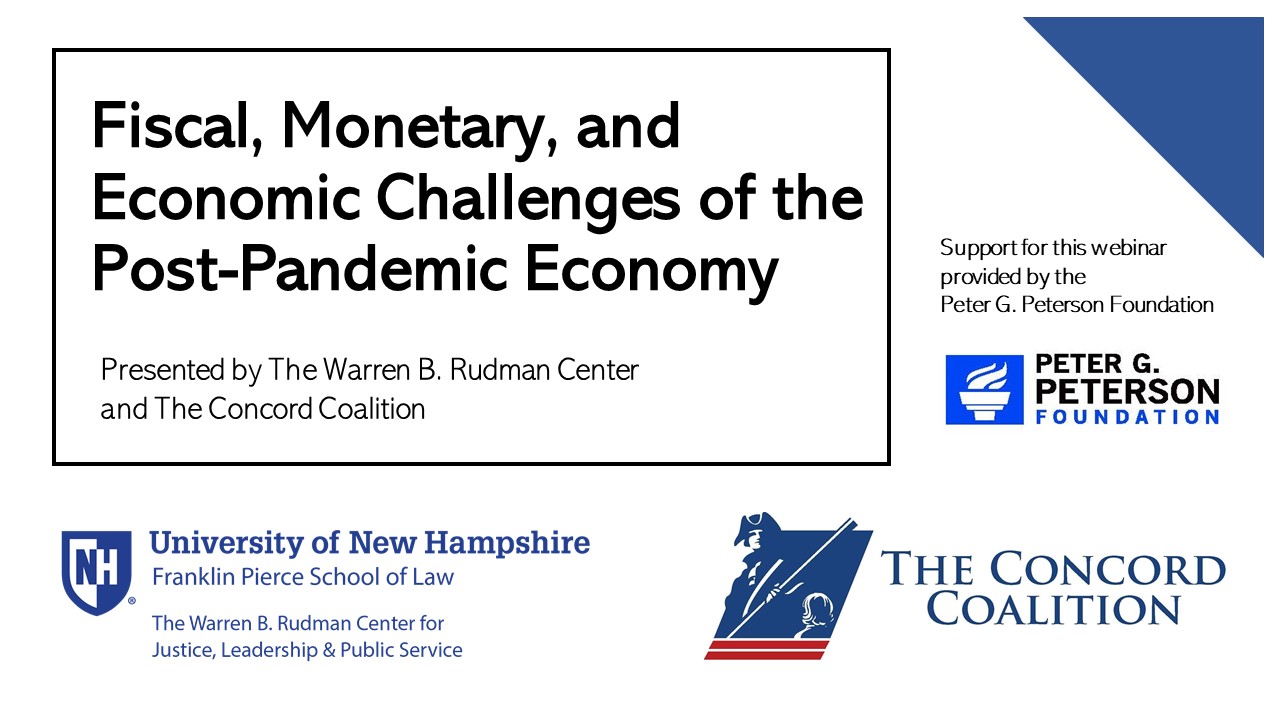On February 17, experts from the Congressional Budget Office, Federal Reserve Bank of Boston, and the Brookings Institution spoke to nearly 200 people via webinar on the “Fiscal, Monetary, and Economic Challenges of the Post-Pandemic Economy.”
The event was open to the public and co-hosted by the Warren B. Rudman Center for Justice, Leadership & Public Service and The Concord Coalition, with support for the program provided by the Peter G. Peterson Foundation.
Scroll to the bottom of this page to watch the entire webinar.

The guest speakers engaged in one-on-one, moderated conversations and fielded questions from the audience.
Congressional Budget Office Director, Phillip Swagel, in a conversation moderated by Concord Coalition Executive Director, Robert L. Bixby, discussed fiscal policy under a new administration and Congress, with a focus on the key challenges facing policymakers and the trade-offs between near-term and long-term events.
“The good news, such as it is, is the economy is doing better than we expected,” Swagel said. “The challenge of the fiscal situation remains daunting; it was daunting before the pandemic and it’s yet more daunting because of the pandemic.”
In addressing a question on whether growing federal budget deficits still matter, Swagel said, “It’s really the key question.”
He was quick to say deficits matter but was sure to emphasize and not discount the importance to the economy of recent pandemic relief measures passed by Congress.
“Over the long-term, the deficit is a challenge, and the rising debt is a challenge to our economic stability and financial stability … but there’s also a challenge of priorities.”
“As net interest payments rise, both with rising interest rates and with the rising debt level, that crowds out other priorities,” Swagel said. “It poses a challenge for policymakers between various priorities.”
Federal Reserve Bank of Boston President and CEO, Eric Rosengren, in a conversation moderated by NPR’ s Chief Economics Correspondent, Scott Horsley, discussed monetary policy in a post-pandemic economy and the roles of interest rates and inflation.
“I would be very surprised if we see a sustained inflation rate at 2 percent in the next year or two,” Rosengren said. “With labor markets as disrupted as they have been, there normally is enough slack that I would expect that we will still be undershooting our 2 percent inflation target.”
“But there will be disruptions that are occurring,” he added. “Commodity prices are a good example, where those prices have gone up pretty quickly; so, food and energy prices may go up as certain areas of the economy are facing some shortages.”
“I think we should do what we need to do for fiscal and monetary policy to get people back to work,” Rosengren said. “Once we’re at full employment, we shouldn’t have the same kind of expansionary fiscal policy.”
“That means either taxes rise or government spending has to decrease in order to have much more of a balanced budget than what we’ve had over quite some time,” he said. “The appropriate policy is that fiscal policy should mitigate some of the problems of the deep recession caused by a public health crisis … but when you get to full employment, you shouldn’t still be having that kind of fiscal stimulus.”
Hamilton Project Director and Senior Fellow at The Brookings Institution, Wendy Edelberg, in a conversation moderated by Concord’s Policy Director, Tori Gorman, discussed pandemic relief legislation, efforts to encourage economic growth, and more.
Edelberg compared the Biden Administration’s proposed COVID-19 relief package to the package that Republicans put forward, and she evaluated their potential economic effects.
Her analysis indicates that Biden’s proposal, although much larger and more costly, could be a safer economic-growth bet than a much smaller package.
“Doing more is an insurance policy,” Edelberg said. “I cannot overstate the uncertainty underlying all of our estimates … if we’re wrong on any one of those sources of our estimates, we could be significantly undershooting.”
On when it might be appropriate for policymakers to start acting on the nation’s growing debt and deficit, Edelberg said her analysis is informed by CBO projections on interest rates, long-term pressures on spending, and revenues under current law.
“At the end of this decade, we do indeed start to see debt-to-GDP rise, and rise without bound,” Edelberg said. “That suggests to me that over the next handful of years, we should be making some difficult decisions to change that long-term trajectory.”
“It’s actually a very simple problem, with pretty simple solutions, and we have no shortage of ideas here,” she added. “These are difficult political issues, not difficult technical issues; over the next few years, it would be really great if we made these difficult choices as a society.”
About the Hosts
The Warren B. Rudman Center at the UNH Franklin Pierce School of Law provides programmatic and financial support for students interested in exploring careers in public service while supporting public programming and academic inquiry that align with its mission. The Concord Coalition is a nonpartisan, nonprofit grassroots organization that educates on the importance of generationally-responsible federal fiscal policy.




